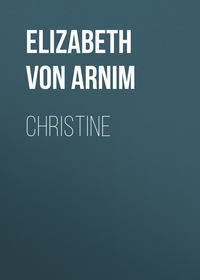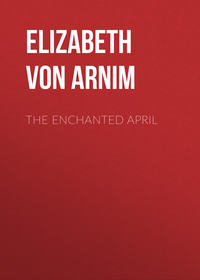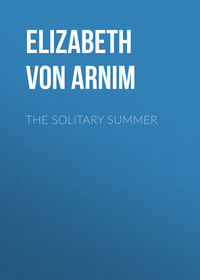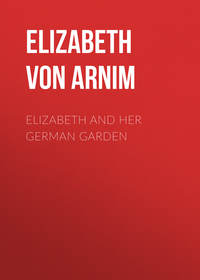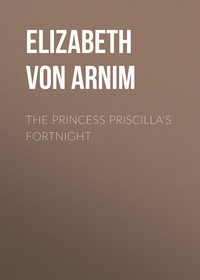 полная версия
полная версияThe Benefactress
What if it seemed an odd, bare place to eyes used to the superfluity of hangings and stuffings that prevailed at Estcourt? These bare boards, these shabby little mats by the side of the beds, the worn foxes' skins before the writing-tables, the cane or wooden chairs, the white calico curtains with meek cotton fringes, the queer little prints on the walls, the painted wooden bedsteads, seemed to her in their very poorness and unpretentiousness to be emblematical of all the virtues. As she lingered in the quiet rooms, while Letty raced along the passages, Anna said to herself that this Spartan simplicity, this absence of every luxury that could still further soften an already languid and effeminate soul, was beautiful. Here, as in the whitewashed praying-places of the Puritans, if there were any beauty and any glory it must all come from within, be all of the spirit, be only the beauty of a clean life and the glory of kind thoughts. She pictured herself waking up in one of those unadorned beds with the morning sun shining on her face, and rising to go her daily round of usefulness in her quiet house, where there would be no quarrels, and no pitiful ambitions, and none of those many bitter heartaches that need never be. Would they not be happy days, those days of simple duties? "The better life—the better life," she repeated musingly, standing in the middle of the big room through whose tall windows she could see the garden, and a strip of marshy land, and then the grey sea and the white of the gulls and the dark line of the Rügen coast over which the dusk was gathering; and she counted on her fingers mechanically, "Simplicity, frugality, hard work. Uncle Joachim said that was the better life, and he was wise—oh, he was very wise—but still–And he loved me, and understood me, but still–"
Looking up she caught sight of herself in a long glass opposite, a slim figure in a fur cloak, with bare head and pensive eyes, lost in reflection. It reminded her of the day the letter came, when she stood before the glass in her London bedroom dressed for dinner, with that same sentence of his persistently in her ears, and how she had not been able to imagine herself leading the life it described. Now, in her travelling dress, pale and tired and subdued after the long journey, shorn of every grace of clothes and curls, she criticised her own fatuity in having held herself to be of too fine a clay, too delicate, too fragile, for a life that might be rough. "Oh, vain and foolish one!" she said aloud, apostrophising the figure in the glass with the familiar Du of the days before her mother died, "Art thou then so much better than others, that thou must for ever be only ornamental and an expense? Canst thou not live, except in luxury? Or walk, except on carpets? Or eat, except thy soup be not of chocolate? Go to the ants, thou sluggard; consider their ways, and be wise." And she wrapped herself in her cloak, and frowned defiance at that other girl.
She was standing scowling at herself with great disapproval when the housemaid, who had been searching for her everywhere, came to tell her that the Herr Oberinspector was downstairs, and had sent up to know if his visit were convenient.
It was not at all convenient; and Anna thought that he might have spared her this first evening at least. But she supposed that she must go down to him, feeling somehow unequal to sending so authoritative a person away.
She found him standing in the inner hall with a portfolio under his arm. He was blowing his nose, making a sound like the blast of a trumpet, and waking the echoes. Not even that could he do quietly, she thought, her new sense of proprietorship oddly irritated by a nose being blown so aggressively in her house. Besides, they were her echoes that he was disturbing. She smiled at her own childishness.
She greeted him kindly, however, in response to his elaborate obeisances, and shook hands on seeing that he expected to be shaken hands with, though she had done so twice already that afternoon; and then she let herself be ushered by him into the drawing-room, a room on the garden side of the house, with French windows, and bookshelves, and a huge round polished table in the middle.
It had been one of the two rooms used by Uncle Joachim, and was full of traces of his visits. She sat down at a big writing-table with a green cloth top, her feet plunged in the long matted hairs of a grey rug, and requested Dellwig to sit down near her, which he did, saying apologetically, "I will be so free."
The servant, Marie, brought in a lamp with a green shade, shut the shutters, and went out again on tiptoe; and Anna settled herself to listen with what patience she could to the loud voice that jarred so on her nerves, fortifying herself with reminders that it was her duty, and really taking pains to understand him. Nor did she say a word, as she had done to the lawyer, that might lead him to suppose she did not intend living there.
But Dellwig's ceaseless flow of talk soon wearied her to such an extent that she found steady attention impossible. To understand the mere words was in itself an effort, and she had not yet learned the German for rye and oats and the rest, and it was of these that he chiefly talked. What was the use of explaining to her in what way he had ploughed and manured and sown certain fields, how they lay, how big they were, and what their soil was, when she had not seen them? Did he imagine that she could keep all these figures and details in her head? "I know nothing of farming," she said at last, "and shall understand your plans better when I have seen the estate."
"Natürlich, natürlich," shouted Dellwig, his voice in strangest contrast to hers, which was particularly sweet and gentle. "Here I have a map—does the gracious Miss permit that I show it?"
The gracious Miss inclined her tired head, and he unrolled it and spread it out on the table, pointing with his fat forefinger as he explained the boundaries, and the divisions into forest, pasture, and arable.
"It seems to be nearly all forest," said Anna.
"Forest! The forest covers two-thirds of the estate. It is the only forest on the entire promontory. Such care as I have bestowed on the forest has seldom been seen. It is grossartig—colossal!" And he lifted his hands the better to express his admiration, and was about to go into lengthy raptures when the map rolled itself up again with loud cracklings, and cut him short. He spread it out once more, and securing its corners began to describe the effects of the various sorts of artificial manure on the different crops, his cleverness in combining them, and his latest triumphant discovery of the superlative mixture that was to strike all Pomerania with awe.
"Ja," said Anna, balancing a paper-knife on one finger, and profoundly bored. "Whose land is that next to mine?" she asked, pointing.
"The land on the north and west belongs to peasants," said Dellwig. "On the east is the sea. On the south it is all Lohm. The gracious one passed through the village of Lohm this afternoon."
"The village where the school is?"
"Quite correct. The pastor, Herr Manske, a worthy man, but, like all pastors, taking ells when he is offered inches, serves both that church and the little one in Kleinwalde village, of which the gracious Miss is patroness. Herr von Lohm, who lives in the house standing back from the road, and perhaps noticed by the gracious Miss, is Amtsvorsteher in both villages."
"What is Amtsvorsteher?" asked Anna, languidly. She was leaning back in her chair, idly balancing the paper-knife, and listening with half an ear only to Dellwig, throwing in questions every now and then when she thought she ought to say something. She did not look at him, preferring much to look at the paper-knife, and he could examine her face at his ease in the shadow of the lamp-shade, her dark eyelashes lowered, her profile only turned to him, with its delicate line of brow and nose, and the soft and gracious curves of the mouth and chin and throat. One hand lay on the table in the circle of light, a slender, beautiful hand, full of character and energy, and the other hung listlessly over the arm of the chair. Anna was very tired, and showed it in every line of her attitude; but Dellwig was not tired at all, was used to talking, enjoyed at all times the sound of his voice, and on this occasion felt it to be his duty to make things clear. So he went into the lengthiest details as to the nature and office of Amtsvorstehers, details that were perfectly incomprehensible and wholly indifferent to Anna, and spared neither himself nor her. While he talked, however, he was criticising her, comparing the laziness of her attitude with the brisk and respectful alertness of other women when he talked. He knew that these other women belonged to a different class; his wife, the parson's wife, the wives of the inspectors on other estates, these were not, of course, in the same sphere as the new mistress of Kleinwalde; but she was only a woman, and dress up a woman as you will, call her by what name you will, she is nothing but a woman, born to help and serve, never by any possibility even equal to a clever man like himself. Old Joachim might have lounged as he chose, and put his feet on the table if it had seemed good to him, and Dellwig would have accepted it with unquestioning respect as an eccentricity of Herrschaften; but a woman had no sort of right, he said to himself, while he so fluently discoursed, to let herself go in the presence of her natural superior. Unfortunately, old Joachim, so level-headed an old gentleman in all other respects, had placed the power over his fortunes in the hands of this weak female leaning back so unbecomingly in her chair, playing with the objects on the table, never raising her eyes to his, and showing indeed, incredible as it seemed, every symptom of thinking of something else. The women of his acquaintance were, he was certain, worth individually fifty such affected, indifferent young ladies. They worked early and late to make their husbands comfortable; they were well practised in every art required of women living in the country; they were models of thrift and diligence; yet, with all their virtues and all their accomplishments, they never dreamed of lounging or not listening when a man was speaking, but sat attentively on the edge of their chairs, straight in the back and seemly, and when he had finished said Jawohl.
Anna certainly did sit very much at her ease, and instead of attending, as she ought to have done, to his description of Amtsvorstehers, was thinking of other things. Dellwig had thick lips that could not be hidden entirely by his grizzled moustache and beard, and he had the sort of eyes known to the inelegant but truthful as fishy, and a big obstinate nose, and a narrow obstinate forehead, and a long body and short legs; and though all this, Anna told herself, was not in the least his fault and should not in any way prejudice her against him, she felt that she was justified in wishing that his manners were less offensive, less boastful and boisterous, and that he did not bite his nails. "I wonder," she thought, her eyes carefully fixed on the paper-knife, but conscious of his every look and movement, "I wonder if he is as artful as he looks. Surely Uncle Joachim must have known what he was like, and would never have told me to keep him if he had not been honest. Perhaps he is perfectly honest, and when I meet him in heaven how ashamed I shall be of myself for having had doubts!" And then she fell to musing on what sort of an appearance a chastened and angelic Dellwig would probably present, and looked up suddenly at him with new interest.
"I trust I have made myself comprehensible?" he was asking, having just come to the end of what he felt was a masterly résumé of Herr von Lohm's duties.
"I beg your pardon?" said Anna, bringing her thoughts back with difficulty from the consideration of nimbuses, "Oh, about Amtsvorstehers—no," she said, shaking her head, "you have not. But that is my fault. I can't understand everything at once. I shall do better later on."
"Natürlich, natürlich," Dellwig vehemently assured her, while he made inward comments on the innate incapacity of all Weiber, as he called them, to grasp the simplest fact connected with law and justice.
"Tell me about the livestock," said Anna, remembering Uncle Joachim's frequent and affectionate allusions to his swine. "Are there many pigs?"
"Pigs?" repeated Dellwig, lifting up his hands as though mere words were insufficient to express his feelings, "such pigs as the gracious Miss now possesses are nowhere else to be found in Pomerania. They are the pride, and at the same time the envy, of the whole province. 'Let my sausages,' said the Herr Landrath last winter, when the time for killing drew near, 'let my sausages consist solely of the pigs reared at Kleinwalde by my friend the Oberinspector Dellwig.' The Frau Landräthin was deeply injured, for she too breeds and fattens pigs, but not like ours—not like ours."
"Who is the Herr Landrath?" asked Anna absently; but immediately remembering the description of the Amtsvorsteher she added quickly, "Never mind—don't explain. I suppose he is some sort of an official, and I shall not be quite clear about these different officials till I have lived here some time."
"Natürlich, natürlich," agreed Dellwig; and leaving the Landrath unexplained he launched forth into a dissertation on Anna's pigs, whose excellencies, it appeared, were wholly due to the unrivalled skill he had for years displayed in their treatment. "I have no children," he said, with a resigned and pious upward glance, "and my wife's maternal instincts find their satisfaction in tending and fattening these fine animals. She cannot listen to their cries the day they are killed, and withdraws into the cellar, where she prepares the stuffing. The gracious Miss ate the cutlets of one this very day. It was killed on purpose."
"Was it? I wish it hadn't been," said Anna, frowning at the remembrance of that meal. "I—I don't want things killed on my account. I—don't like pig."
"Not like pig?" echoed Dellwig, dropping his lower jaw in his amazement. "Did I understand aright that the gracious one does not eat pig's flesh gladly? And my wife and I who thought to prepare a joy for her!" He clasped his hands together and stared at her in dismay. Indeed, he was so much overcome by this extraordinary and wilful spurning of nature's best gifts that for a moment he was silent, and knew not how he should proceed. Were there not concentrated in the body of a single pig a greater diversity of joys than in any other form of pleasure that he could call to mind? Did it not include, besides the profounder delights of its roasted ribs, such solid satisfactions as hams, sausages, and bacon? Did not its liver, discreetly manipulated, rival the livers of Strasburg geese in delicacy? Were not its brains a source of mutual congratulation to an entire family at supper? Did not its very snout, boiled with peas, make an otherwise inferior soup delicious? The ribs of this particular pig were reposing at that moment in a cool place, carefully shielded from harm by his wife, reserved for the Easter Sunday dinner of their new mistress, who, having begun at her first meal with the lesser joys of cutlets, was to be fed with different parts in the order of their excellence till the climax of rejoicing was reached on Easter Day in the dish of Schweinebraten, and who was now declaring, in a die-away, affected sort of voice, that she did not want to eat pig at all. Where, then, was her vulnerable point? How would he ever be able to touch her, to influence her, if she was indifferent to the chief means of happiness known to the dwellers in those parts? That was the real aim and end of his labours, of the labours, as far as he could see, of everyone else—to make as much money as possible in order to live as well as possible; and what did living well mean if it did not mean the best food? And what was the best food if not pig? Not to be killed on her account! On whose account, then, could they be killed? With an owner always about the place, and refusing to have pigs killed, how would he and his wife be able to indulge, with satisfactory frequency, in their favourite food, or offer it to their expectant friends on Sundays? He mourned old Joachim, who so seldom came down, and when he did ate his share of pork like a man, more sincerely at that moment than he would have thought possible. "Mein seliger Herr," he burst out brokenly, completely upset by the difference between uncle and niece, "mein seliger Herr——" And then, unable to go on, fell to blowing his nose with violence, for there were real tears in his eyes.
Anna looked up, surprised. She thought he had been speaking of pigs, and here he was on a sudden bewailing his late master. When she saw the tears she was deeply touched. "Poor man," she said to herself, "how unjust I have been. Of course he loved dear Uncle Joachim; and my coming here, an utter stranger, taking possession of everything, must be very dreadful for him." She got up, at once anxious, as she always was, to comfort and soothe anyone who was sad, and put her hand gently on his arm. "I loved him too," she said softly, "and you who knew him so long must feel his death dreadfully. We will try and keep everything just as he would have liked it, won't we? You know what his wishes were, and must help me to carry them out. You cannot have loved him more than I did—dear Uncle Joachim!"
She felt very near tears herself, and condoned the sonorous nose-blowing as the expression of an honourable emotion.
And Dellwig, when he presently reached his home and was met at the door by his wife's eager "Well, how was she?" laconically replied "Mad."
CHAPTER VII
When Anna woke next morning she had a confused idea that something annoying had happened the evening before, but she had slept so heavily that she could not at once recollect what it was. Then, the sun on her face waking her up more thoroughly, she remembered that Susie had stayed upstairs with Hilton till supper time, had then come down, glanced with unutterable disgust at the raw ham, cold sausage, eggs, and tepid coffee of which the evening meal was composed, refused to eat, refused to speak, refused utterly to smile, and afterwards in the drawing-room had announced her fixed intention of returning to England the next day.
Anna had protested and argued in vain; nothing could shake this sudden determination. To all her expostulations and entreaties Susie replied that she had never yet dwelt among savages and she was not going to begin now; so Anna was forced to conclude that Hilton had been making a scene, and knowing the effect of Hilton's scenes she gave up attempting to persuade, but told her with outward firmness and inward quakings that she herself could not possibly go too.
Susie had been very angry at this, and still more angry at the reason Anna gave, which was that, having invited the parson and his wife to dinner on Saturday, she could not break her engagement. Susie told her that as she would never see either of them again—for surely she would never again want to come to this place?—it was absurd to care twopence what they thought of her. What on earth did it matter if two inhabitants of the desert were offended or not offended once she was on the other side of the sea? And what did it matter at all how she treated them? She heaped such epithets as absurd, stupid, and idiotic on Anna's head, but Anna was not to be moved. She threatened to take Miss Leech and Letty away with her, and leave Anna a prey to the criticisms of Mrs. Grundy, and Anna said she could not prevent her doing so if she chose. Susie became more and more excited, more and more Dobbs, goaded by the recollection of what she had gone through with Hilton, and Anna, as usual under such circumstances, grew very silent. Letty sat listening in an agony of fright lest this cup of new experiences were about to be dashed prematurely from her eager lips; and Miss Leech discreetly left the room, though not in the least knowing where to go, finally seeking to drive away the nervous fears that assailed her in her lonely, creaking bedroom, where rats were gnawing at the woodwork, by thinking hard of Mr. Jessup, who on this occasion proved to be but a broken reed, pitted against the stern reality of rats.
The end of it, after Susie had poured out the customary reproaches of gross ingratitude and forgetfulness of all she had done for Anna for fifteen long years, was that Miss Leech and Letty were to stay on as originally intended, and come home with Anna towards the end of the holidays, and Susie would leave with Hilton the very next day.
Anna's attempt to make it up when she said good-night was repulsed with energy. Anna was for ever doing aggravating things, and then wanting to make it up; but makings up without having given in an inch seemed to Susie singularly unsatisfactory ceremonies. Oh, these Estcourts and their obstinacy! She marched off to bed in high indignation, an indignation not by any means allowed to cool by Hilton during the process of undressing; and Anna, worn out, fell asleep the moment she lay down, and woke up, as she had pictured herself doing in that odd wooden bed, with the morning sun shining full on her face.
It was a bright and lovely day, and on the side of the house where she slept she could not hear the wind, which was still blowing from the north-west. She opened one of her three big windows and let the cold air rush into her room, where the curious perfume of the baked evergreen wreaths festooned round the walls and looking-glass and dressing-table, joined to the heat from the stove, produced a heavy atmosphere that made her gasp. Somebody must already have been in her room, for the stove had been lit again, and she could see the peat blazing inside its open door. But outside, what a divine coldness and purity! She leaned out, drinking it in in long breaths, the warm March sun shining on her head. The garden, a mere uncared-for piece of rough grass with big trees, was radiant with rain-drops; the strip of sea was a deep blue now, with crests of foam; the island coast opposite was a shadowy streak stretched across the feet of the sun. Oh, it was beautiful to stand at that open window in the freshness, listening to the robin on the bare lilac bush a few yards away, to the quarrelling of the impudent sparrows on the path below, to the wind in the branches of the trees, to all the happy morning sounds of nature. A joyous feeling took possession of her heart, a sudden overpowering delight in what are called common things—mere earth, sky, sun, and wind. How lovely life was on such a morning, in such a clean, rain-washed, wind-scoured world. The wet smell of the garden came up to her, a whiff of marshy smell from the water, a long breath from the pines in the forest on the other side of the house. How had she ever breathed at Estcourt? How had she escaped suffocation without this life-giving smell of sea and forest? She looked down with delight at the wildness of the garden; after the trim Estcourt lawns, what a relief this was. This was all liberty, freedom from conventionality, absolute privacy; that was an everlasting clipping, and trimming, and raking, a perpetual stumbling upon gardeners at every step, for Susie would not be outdone by her greater neighbours in these matters. What was Hill Street looking like this fine March morning? All the blinds down, all the people in bed—how far away, how shadowy it was; a street inhabited by sleepy ghosts, with phantom milkmen rattling spectral cans beneath their windows. What a dream that life lived up to three days ago seemed in this morning light of reality. White clouds, like the clouds in Raphael's backgrounds, were floating so high overhead that they could not be hurried by the wind; a black cat sat in a patch of sunshine on the path washing itself; somebody opened a lower window, and there was a noise of sweeping, presently made indistinguishable by the chorale sung by the sweeper, no doubt Marie, in a pious, Good Friday mood. "Lob Gott ihr Christen allzugleich," chanted Marie, keeping time with her broom. Her voice was loud and monotonous, but Anna listened with a smile, and would have liked to join in, and so let some of her happiness find its way out.
She dressed quickly. There was no hot water, and no bell to ring for some, and she did not choose to call down from the window and interrupt the hymn, so she used cold water, assuring herself that it was bracing. Then she put on her hat and coat and stole out, afraid of disturbing Susie, who was lying a few yards away filled with smouldering wrath, anxious to have at least one quiet hour before beginning a day that she felt sure was going to be a day of worries. "There will be great peace to-night when she is gone," she thought, and immediately felt ashamed that she should look forward to being without her. "But I have never been without her since I was ten," she explained apologetically to her offended conscience, "and I want to see how I feel."


